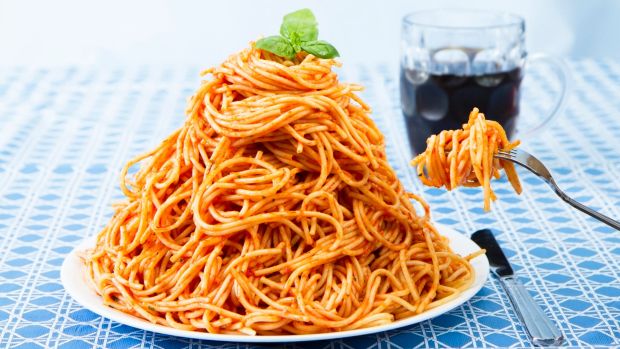
As simple as eating less? Some say so. Photo: Getty Images
Eat Less You Pig. This is the charming slogan one fed-up nutritionist had printed onto T-shirts which she then gave to her clients. She gave one such T-shirt to Texas University historian and food writer James McWilliams.
McWilliams was horrified by the aggressive message, but nevertheless pondered its pertinence in a new piece for Huffington Post, titled The Exponential Benefit of Eating Less.
“The more I engage with the politics of the plate – specifically, the more I consider what it means to eat ethically – the more I appreciate the spirit of this message,” he writes.
Why?
Well, there is the fact that obesity rates have doubled in the United States since 1980. Here, they have doubled in the past 20 years and, if the rates continue, it is estimated that 80 per cent of all Australian adults and one third all children will be overweight or obese by 2025.
The average Australian now eats about a tonne of food a year, however most people would be horrified to realise how much of this energy intake is from food that is essentially useless.
Somewhere along the line “party foods”, such as lollies, chips and soft drinks, became “everyday foods” and we are eating 30 per cent less fruit and vegetables than 15 years ago.
Despite this, 200 kilograms of food per person are wasted every year in Australia.
Clearly, eating less food but more nutrients could benefit most of us from a health perspective.
“An additional benefit of eating less food is environmental,” McWilliams argues.
“Americans today consume about 57 per cent more meat than we did in the 1950s. We eat four times more cheese, 20 times more yoghurt, eight times more corn sweeteners, and 18 per cent more wheat flour.
“All of these goods require more resources to produce and they emit more greenhouse gasses than their lower-impact counterparts – namely fruits and vegetables.”
A 25-year study also found that monkeys whose calorie intake was restricted by 30 per cent lived longer and endured fewer age-related diseases. Some scientists questioned the study’s design and whether it would, in fact improve longevity. However, one of these scientists conceded to The New York Times: “There is no doubt that with an overweight population, a 10 per cent reduction in body weight would have tremendous health benefits.”
Accredited practising dietitian Jessica Bailes agrees that “lots of people need to lose weight” and that there is an environmental impact from the foods we eat or throw away.
“The decisions you make are important,” she says, pointing out that “reducing red meat consumption, for instance, is the quickest and easiest way to reduce your carbon footprint.”
That said, she takes issue with the “Eat less you fat pig” approach.
“It’s pretty brutal,” she says. “There was a gluttonous message in that.”
But, she says, it is a societal problem; portion sizes and plates are bigger, junk food is more accessible and advertising is unavoidable.
“People aren’t greedier than they were 50 years ago,” Bailes says. “Being aware of the societal impact can empower you to be aware of what you are eating.
“Rather than saying ‘it’s your fault – you are eating too much’, it’s about being more conscious of the world around us and how we impact it.”
For his part, McWilliams argues that it really is as simple as eating less (of everything).
It bypasses us getting too stuck on the nitty gritty of the food politics conversation and covers all bases.
“If the most effective start we can initiate is to eat less food, and I think it is, we need to look beyond the fact that we eat like pigs – or even that we eat pigs – to the underlying causes of that desperate gluttony,” he says.
“What we’ll discover is that, for all our angst over food, the politics of the plate is, alas, really just politics.”
